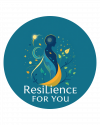Have you ever found yourself in a relationship pattern that feels strangely familiar, yet deeply unsettling? Perhaps you keep attracting a certain type of person, or find yourself reacting in ways that surprise even you. It’s a common, often painful, realization that the foundations of our earliest experiences can subtly (or not so subtly!) shape the way we connect, or disconnect, as adults.
At Resilience For You, we believe in untangling these threads, not to place blame, but to empower you with understanding and choice. This isn’t about dwelling on the past, but rather recognizing how those formative years, particularly if they involved certain challenges, might be whispering (or shouting!) into your current love life. Understanding this connection is the first step towards writing a brand new, healthier love story for yourself.
The Silent Script: How Childhood Experiences Can Shape Our Adult Love Life

Imagine your childhood as the setting for your first great play. The experiences you had, the interactions you witnessed, the emotions you felt, they all became lines in a script, sometimes deeply ingrained. If, as a child, you experienced:
- Neglect or abandonment: Feeling unseen, unheard, or left alone.
- Unhealthy parental conflict: Witnessing constant arguments, tension, or emotional distance between caregivers.
- Parental addiction or illness: Carrying responsibilities beyond your years, or living with instability.
- Abuse (physical, verbal, emotional): Being subjected to hurtful words, actions, or emotional manipulation.
- Broken trust: Watching parents lie or cheat without real consequence.
- Violated boundaries: Your needs or personal space consistently ignored.
- Lack of respect or validation: Feeling like your voice didn’t matter.
- Parents struggling with their own trauma: Inheriting patterns of anger, depression, or emotional unavailability.
- Early loss or chronic illness: Navigating significant grief or fear at a young age.
- Bullying or social isolation: Feeling like an outsider or unworthy of connection.
When our early script includes these challenging themes, we might unknowingly learn to “normalize” behaviors that are far from healthy. We might not have had a clear model for strong boundaries, the power of “no,” or the importance of self-care. This isn’t a fault; it’s a learned survival mechanism.
Are Old Wounds Steering Your Relationships? Signs to Watch For:
It’s empowering to recognize when these old scripts might be playing out in your current relationships. Here are some gentle signs that your past experiences might be at the helm of your relationship patterns:
- Lingering Longer Than You Should: You have a persistent feeling of low self worth, perhaps stemming from childhood, causing you to stay in relationships that clearly aren’t serving you. You deserve more.
- The “Unattractiveness” Myth: You start to lose faith in your own magnetic ability to attract a truly kind, loving, and attentive partner, settling for less than you dream of.
- The Avoidance Trap: You find yourself drawn to partners who are emotionally distant, dishonest, or create instability, even though deep down you crave connection and security.
- The Endless Loop of Chances: You give someone countless opportunities to hurt you in the same way, hoping for a different outcome, but finding the pattern repeats.
- The Self-Doubt Spiral: Instead of seeing an unhealthy situation clearly, you doubt your own perceptions and intuition, wondering if you’re “crazy” or overreacting.
- The Blame Magnet: You internalize your partner’s poor behavior, believing it’s somehow your fault. “If only I were better, they would change,” you might think. But their actions are a reflection of them, not you.
- The Commitment Challenge: When someone expresses disinterest in commitment, you interpret it as a challenge, an invitation to try harder to “win” their love.
- The Unpaid Caretaker: You feel an overwhelming duty to “fix” or “heal” others, often at the expense of your own well-being, safety, and happiness. You pour from an empty cup.
Remember this crucial truth: People don’t change because you want them to. They change when they are ready. It’s not your job to wait endlessly in their waiting room. Your well being is paramount.

Navigating the Red Flags: When to Consider Letting Go
Deciding to end a relationship is one of life’s most challenging decisions. No one can tell you definitively what is right for you. That power resides within you. However, if you’re feeling lost or unsure, these signs can offer loving guidance, helping you discern if it’s time to create space for something healthier.
- The Broken Record of Behavior: Lying, Cheating, and Repeated Betrayals. Actions speak volumes, yet when we’re caught in cycles rooted in past trauma, we might give far too many chances for the same hurtful patterns to repeat.

While relationships can heal after a breach of trust (like infidelity), it requires immense commitment from both sides. The person who broke trust must take full ownership of their actions, be willing to genuinely receive your pain, and both must commit to deep inner work. If lying or cheating is repeated, it’s a clear sign they are either unwilling or unable to change at this time, perhaps due to unresolved issues like addiction or mental illness. Your boundaries are being violated, and that is never okay.
- The Whispers of Doubt: You Question Your Own Reality. Living in an emotionally chaotic or unstable environment can make your sense of self foggy. If you find yourself constantly second guessing your feelings, or doubting your gut instinct even when it screams “something’s wrong!” please, trust that inner voice. A relationship that consistently makes you feel anxious, gives you stomach knots, or leaves you feeling insecure and uncertain, is not a self loving choice. While some conflict is normal, healthy couples can acknowledge feelings, communicate openly, and tend to each other’s hearts.

3. The Empty Promises Carousel: “I’ll Change, I Promise.” When hurtful behaviors are consistently followed by empty promises and no real change, you are experiencing emotional manipulation. There’s no softer way to say it. Making excuses for them or justifying their inaction only perpetuates a cycle of disappointment and hurt for you. People who are unwilling or unable to change, often due to their own unaddressed trauma, addiction, or mental illness, cannot be saved by your love. Your role is not their rescuer.
4. The Secret Keeper: Hiding Your Truth from Loved Ones. If you find yourself consistently concealing the reality of your relationship from friends and family who care about you, that’s a flashing red light. Deep down, you likely know something isn’t right, and you anticipate their judgment or concern if they knew the full truth. This secrecy often means a part of you is still clinging to what causes you pain. It’s a sign that it might be time to gently release the grip.
5. The Unrequited Truth: “I’m Not in Love with You Anymore.” Sometimes, the truth is agonizingly clear. When someone tells you they are no longer in love or attracted to you, believe them. It’s incredibly painful to hear, and you might instinctively try to “spin” their words to hold on a little longer. This isn’t a reflection of your worth; it’s a reflection of their feelings. This natural craving for love and validation is universal, but you won’t find it where it’s openly withheld. This is you moving towards something better.

6. The Gaslighting Game: “You’re Crazy!” or The Ghosting Act. What happens when you express your hurt over a boundary violation? Are they able to engage in a conversation, apologize, and commit to repair? Or do they twist your words, deny events, or dismiss your emotions until you’re utterly confused, doubting your own sanity? Do they disappear (ghost) when things become vulnerable? These are deeply unhealthy patterns. Unless they are willing to do the profound inner work, perhaps with professional support, it’s time to prioritize your peace.

7. The Commitment Wall: “I Don’t Believe in Commitment.” Believe them. When someone clearly states they don’t “believe in” or “want commitment,” they mean it. This isn’t an invitation for you to try harder, or a sign that you’re not good enough. It’s a fundamental incompatibility, a deal breaker. You cannot force someone to want what they don’t. While rejection hurts deeply, recognizing this truth is you taking a stand for what you truly desire. A self loving future requires you to be willing to release what doesn’t serve your highest good.
8. The Unpaid Therapist: Trying to “Heal” Someone Who Won’t Do the Work. If you’ve played the role of a caretaker in your past, or grew up too quickly, you might instinctively feel responsible for carrying others’ burdens. But it’s not your duty to save or fix someone who isn’t committed to their own healing. When all your energy is poured into helping someone unwilling to help themselves (especially with addiction or mental illness), you’re not truly helping them, and you’re depleting yourself. People change when they choose to, often after hitting their own rock bottom. Your empathy is a gift, but it shouldn’t be a sacrifice of your own well-being.

Breaking the cycle of generational trauma is incredibly challenging, but it is absolutely possible. It starts with awareness, self compassion, and the courageous choice to heal. You deserve a love that feels safe, respectful, and reciprocal.
Ready to start your journey from being stuck in old patterns to building resilient, healthy relationships?
As your relationship life coach, I am here to guide you. Together, we can gently unpack these childhood echoes, recognize their influence, and develop powerful strategies to foster self worth, set healthy boundaries, and attract the kind of love you truly deserve.
Let’s explore your path to healing and thriving in love. I offer free discovery calls where we can chat about your unique situation, your challenges, and your hopes for the future. There’s no obligation, just an open conversation about how personalized coaching can empower you to break free from old scripts and write your own beautiful love story.
Click here to schedule your FREE Discovery Call today
You are resilient. You are worthy. And a brighter, healthier relationship future awaits.

